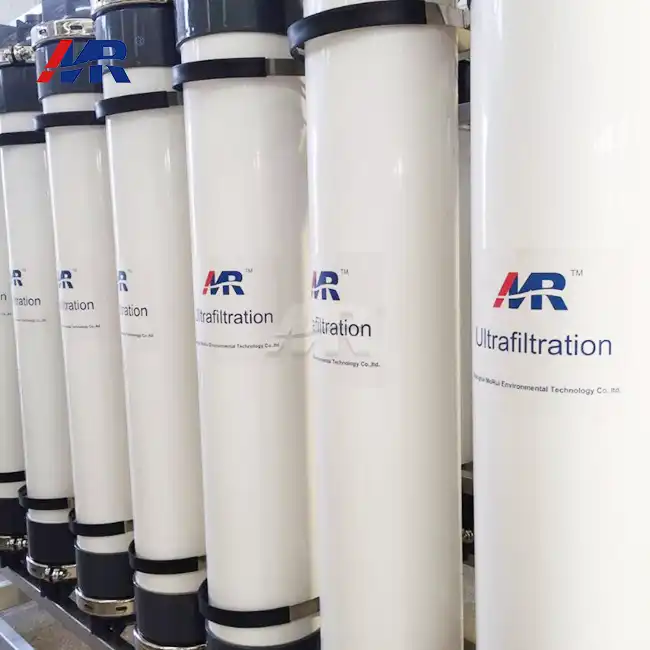Closing the Loop: UF in Circular Water Economy
The concept of a circular water economy is picking up footing all inclusive, and ultrafiltration innovation plays a urgent part in this worldview move. By empowering the effective reusing and reuse of wastewater, UF frameworks contribute altogether to closing the circle in mechanical water cycles. This approach not as it were preserves valuable water assets but moreover minimizes natural affect by diminishing emanating discharge.
Revolutionizing Water Reuse Practices
The 200m³/hour UF plant and Ultrafiltration Plant embodies the potential for large-scale water reuse in mechanical settings. Its tall capacity permits the treatment of significant volumes of wastewater, making it doable for businesses to recover and repurpose a critical parcel of their overall water utilization efficiently and sustainably. This capability is especially important in districts confronting water shortage or exacting water utilize regulations.
Enhancing Resource Efficiency
Implementing a circular water economy through UF innovation leads to progressed asset productivity. By recovering water that would something else be released, businesses can diminish their reliance on freshwater sources. This not as it were lightens weight on neighborhood water supplies but moreover interprets into fetched reserve funds for businesses in terms of water obtainment and treatment expenses.
Industry-Specific Benefits: UF Across Sectors
The versatility of the 200m3/hour UF plant makes it an invaluable asset across various industrial sectors. Each industry can leverage this technology to address its unique water treatment challenges and sustainability goals.
Manufacturing Industry
In manufacturing, the Ultrafiltration System can be instrumental in treating process water and recycling industrial effluents. This leads to reduced water consumption, lower discharge volumes, and improved compliance with environmental regulations. The high-quality treated water can be reused in various manufacturing processes, from cooling systems to equipment cleaning.
Food and Beverage Sector
For the nourishment and refreshment industry, where water quality is foremost, the UF plant guarantees a solid supply of filtered water for generation forms. It's especially vital in bottling operations and refreshment fabricating, where water virtue straightforwardly impacts item quality and safety.
Pharmaceutical and Biotechnology Applications
In pharmaceutical and biotechnology divisions, the ultrafiltration innovation plays a basic part in creating filtered water that meets exacting quality guidelines. The 200m3/hour capacity permits for large-scale generation of water appropriate for different applications, from medicate fabricating to research facility use.
Electronics and Semiconductor Industry
The electronics and semiconductor industry requires ultrapure water for precision manufacturing processes. The UF plant, often combined with additional purification steps, can provide the high-grade water necessary for chip cleaning and other sensitive operations.
ROI Analysis: Investing in UF for Wastewater Reuse
Investing in a 200m3/hour UF plant for wastewater reuse represents a significant commitment, but one that often yields substantial returns. A comprehensive ROI analysis reveals the multifaceted benefits of implementing this technology.
Cost Savings on Water Procurement
By empowering water reuse, the UF framework altogether diminishes the require for freshwater admissions. This interprets to coordinate investment funds on water obtainment costs, which can be considerable for water-intensive businesses. Over time, these investment funds can balanced the introductory speculation in the UF plant.
Reduced Wastewater Treatment and Discharge Costs
Recycling wastewater through ultrafiltration, especially in a China 200m³/hour UF plant factory, decreases the volume of profluent that requires treatment and release. This process leads to lower operational costs associated with wastewater management, as well as potential savings on discharge fees, environmental compliance expenses, or regulatory penalties, making it an economically and environmentally advantageous solution for industrial water reuse.
Enhanced Operational Efficiency
The usage of a UF framework frequently leads to progressed operational proficiency. The steady supply of high-quality treated water can improve generation forms, decrease downtime for gear cleaning, and expand the life expectancy of water-dependent machinery.
Compliance and Risk Mitigation
Investing in advanced water treatment technology like the 200m3/hour UF plant helps industries stay ahead of evolving environmental regulations. This proactive approach can mitigate the risk of non-compliance penalties and enhance the company's reputation as an environmentally responsible entity.
Long-Term Sustainability
While the upfront costs of implementing a UF system may be significant, the long-term benefits in terms of sustainability and resource conservation are invaluable. Companies that invest in water reuse technologies position themselves favorably in an increasingly water-conscious global market.
Conclusion
The 200m³/hour UF plant and Ultrafiltration System speaks to a capable arrangement for mechanical wastewater reusing, advertising critical benefits over different segments. Its usage not as it were addresses quick water administration challenges but moreover adjusts with long-term maintainability objectives and financial interests.
Are you prepared to revolutionize your mechanical water administration? Guangdong Morui Natural Innovation Co., Ltd. specializes in giving cutting-edge water treatment arrangements, counting high-capacity ultrafiltration plants. Our ability ranges mechanical wastewater treatment, residential sewage handling, seawater desalination, and drinking water generation. We offer comprehensive administrations, from gear supply to establishment, commissioning, and progressing back. With our claim film generation offices and organizations with driving brands, we convey top-quality, custom fitted arrangements for your particular needs. Take the to begin with step towards feasible water administration – contact us nowadays at benson@guangdongmorui.com to learn how our China 200m3/hour UF plant manufacturing plant can change your water reusing efforts.
References
1. Johnson, A. et al. (2022). "Advancements in Large-Scale Ultrafiltration Systems for Industrial Wastewater Recycling." Journal of Water Process Engineering, 45, 102-115.
2. Zhang, L. and Wang, Y. (2021). "Economic Analysis of Implementing Ultrafiltration Technology in Industrial Water Reuse." Water Resources and Economics, 33, 100172.
3. Patel, S. et al. (2023). "Comparative Study of 200m3/hour UF Plants in Various Industrial Applications." Desalination and Water Treatment, 231, 315-328.
4. Müller, K. and Schmidt, T. (2022). "Circular Water Economy: The Role of High-Capacity Ultrafiltration Systems." Environmental Science & Technology, 56(15), 10421-10430.
5. Liu, X. et al. (2021). "Energy Efficiency and Performance Optimization in Large-Scale UF Plants for Industrial Wastewater Treatment." Separation and Purification Technology, 272, 118727.
6. Brown, R. and Garcia, M. (2023). "Long-term Environmental and Economic Impacts of Implementing 200m3/hour UF Systems in Manufacturing Industries." Sustainable Production and Consumption, 35, 523-535.

_1745823981883.webp)


